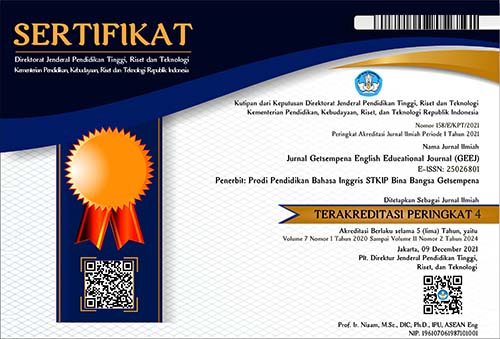ANALYSIS OF TEACHER'S POLITENESS INTERACTION WITH STUDENTS IN ENGLISH TEACHING
Abstract
The goal of this study is to clarify various forms of speech politeness in the conversation of teachers and students working together to learn English in an elementary school in the city of Medan. Utilizing a qualitative approach, this investigation. Data collection methods include observational methods, transcription techniques, and various methods for taking notes. The aim is to determine the purpose of the principle of politeness in language selection learning exercises and how to speak politely between instructors and pupils. The findings of this study show that using courtesy in influences the language and the feelings of the teacher’s nine maxims from the ten maxims that teachers in linguistic etiquette, specifically: 1) Opinion Maxim Reticence, 2) Agreement Maxim3) Maxim of Sympathy, 4) Maxim of Generosity, 5) Maxim of Approval, 6) Maxim of Obligation S towards O, 7) Maxim of Wisdom 8) Maxim of Humility, 9) Maxim of Feeling Toughness. In conclusion, polite communication between teachers and Students frequently speak Indonesian instead of English. Here is the teacher's attention in teaching in class with polite language.
References
Agustina, S., Cahyono, B.Y. (2016). Retrieved from http://ijllnet.com/journals/Vol_3_No _2_June_2016/12.pdf.
Bardovi‐Harlig, K. (2018). The teaching of pragmatics. The TESOL encyclopedia of English language teaching, 1-7.
Bou‐Franch, P., & Clavel‐Arroitia, B. (2012). Pragmatic transfer. The Encyclopedia of Applied Linguistics, 1-5.
Daulay, SH., (2011). Introduction to General Linguistics. Medan: La-Tansa Press.
Daulay, S.H., Ningrum, D.W. & Nasution, P.S. (2022). Learning Process of Online Class by Using Language Politeness Principles. Jurnal Ilmiah Peuradeun, 10(2), 403-420.
Glaser, K. (2009). Acquiring Pragmatic Competence in a foreign language mastering preferred speech acts. Chemnitz University of Technology.
Hymes, D. H. (1998). When is oral narrative poetry? Generative form and its pragmatic conditions. Pragmatics, 8(4), 475-500.
Ishihara, N. (2007). Web-based curriculum for pragmatics instruction in Japanese as a foreign language: An explicit awareness-raising approach. Language Awareness, 16(1), 21-40.
Lee, E. L. (2016). Language and Culture Language and Culture. https://doi.org/10.1093/acrefore/978 0190228613.013.26
Leech, G. N. (2014). The pragmatics of politeness. Oxford University Press, USA.
Leech, Geoffrey N. (2014) The Pragmatics of Politeness. New York: Oxford University Press.
Lin W, 2017. On the Strategies of Graduation Thesis Writing Teaching of Translation Major Undergraduates Based on Eco-Translatology. English Language Teaching, 63, 10(8)
Mughofar, M. N. K. (2018). Tindak Tutur Direktif Dalam Family Development Session (Fds)(Kajian Sosiopragmatik). Jurnal Pesona, 4(2), 10-18.
Myers, G. (1989). The pragmatics of politeness in scientific articles. Applied linguistics, 10(1), 1-35.
Nadar, F. X., Wijana, I. D. P., Poedjosoedarmo, S., & Djawanai, S. (2005). Penolakan dalam Bahasa Inggris dan Bahasa Indonesia. Humaniora, 17(2), 166-178.
Nunn, R. (2006). The pragmatics of cooperation and relevance for teaching and learning. The Linguistics Journal. 1 (1), 5-16.
Onwuegbuzie, A. J., & Leech, N. L. (2005). On becoming a pragmatic researcher: The importance of combining quantitative and qualitative research methodologies. International journal of social research methodology, 8(5), 375-387.
Pasaribu, G., Daulay, S. H., Nasution, P. (2022). Pragmatics Principles of English Teachers in Islamic Elementary School. Journal of Pragmatics Research. 4(1). 29-40. https://e-journal.iainsalatiga.ac.id/index.php/jopr/article/view/6582/2098
Taufiq, A. M. (2018). A Study of Humor in Bone Regency: A Socio-pragmatic Review. Journal of Language Teaching and Research, 9(1), 141-146.
Zastika Y, 2020. Learning and Pragmatic Values: Students' Positive Politeness Strategies inEnglish Learning.
Zhu, Wuhan, 2012. Polite requestive strategies in Emails: An investigation of pragmaticcompetence of Chinese EFL learners. RELC Journal, 217- 238, 43(2)























